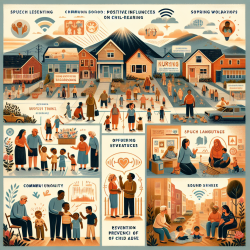Introduction
In the realm of special education and therapy, the challenges faced by practitioners are as diverse as the individuals they serve. One area that demands attention is the support for breastfeeding among women employed in Mexico's informal sector. The research article titled "Breastfeeding among women employed in Mexico’s informal sector: strategies to overcome key barriers" sheds light on the barriers these women face and offers strategies to overcome them. This blog post explores how practitioners can leverage online therapy services to address these challenges and improve their skills in supporting breastfeeding mothers.
Understanding the Barriers
The research highlights several barriers to breastfeeding among women in Mexico's informal sector. These barriers include the lack of formal labor protections, such as paid maternity leave, and the economic vulnerability faced by these women. Additionally, cultural beliefs and misinformation further complicate the situation. Practitioners working with these women need to be aware of these barriers to provide effective support.
Strategies for Practitioners
Practitioners can play a crucial role in supporting breastfeeding mothers by implementing the strategies outlined in the research. Here are some actionable steps:
- Advocacy for Policy Changes: Engage in advocacy efforts to promote policies that support breastfeeding among informally employed women. Encourage the development of universal social protection programs that include paid maternity leave and access to healthcare.
- Education and Awareness: Educate women about their rights related to breastfeeding and employment. Provide information on the benefits of breastfeeding and dispel common myths and misconceptions.
- Online Support Groups: Utilize online platforms to create support groups for breastfeeding mothers. These groups can provide a safe space for women to share experiences, seek advice, and receive emotional support.
- Teletherapy Sessions: Offer teletherapy sessions to provide personalized guidance and support to breastfeeding mothers. These sessions can address specific challenges and offer practical solutions.
Encouraging Further Research
While the research provides valuable insights, there is still much to learn about the barriers faced by breastfeeding mothers in informal employment. Practitioners are encouraged to conduct further research to explore innovative solutions and strategies. By collaborating with academic institutions and organizations, practitioners can contribute to the development of evidence-based interventions that support breastfeeding mothers.
Conclusion
As practitioners in the field of special education and therapy, it is our responsibility to support breastfeeding mothers and advocate for policies that protect their rights. By implementing the strategies outlined in the research and encouraging further research, we can empower women in Mexico's informal sector to overcome barriers and achieve their breastfeeding goals. Together, we can create a supportive environment that promotes the health and well-being of both mothers and their children.
To read the original research paper, please follow this link: Breastfeeding among women employed in Mexico’s informal sector: strategies to overcome key barriers.










